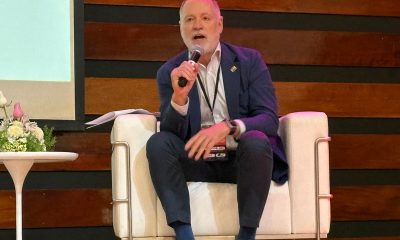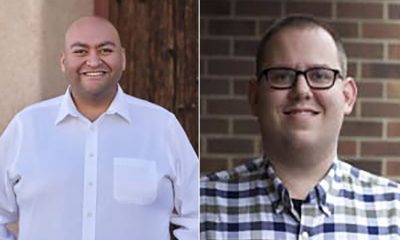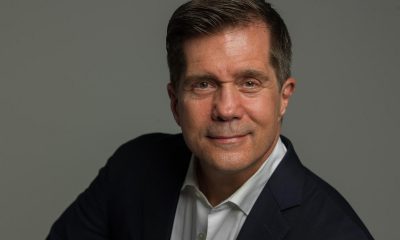News
Activistas nicaragüenses asisten taller de Victory Institute
Protestas contra el gobierno han dejado cientos de muertos
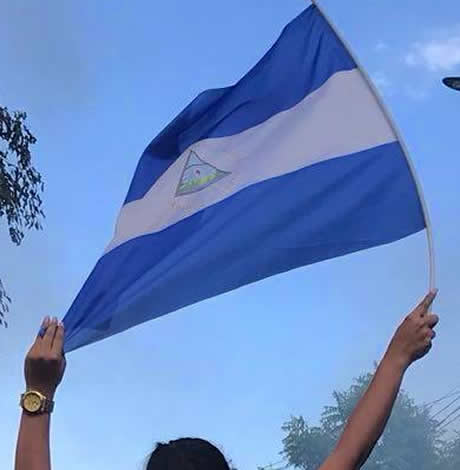
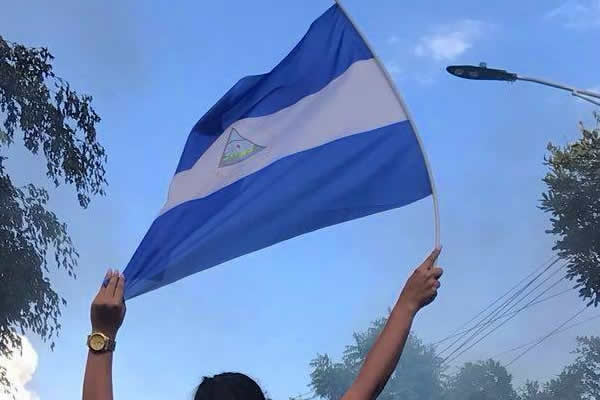
Un grupo de cinco activistas nicaragüenses asistieron a un taller patrocinado por el Victory Institute que se realizó cerca de la capital hondureña de Tegucigalpa el pasado fin de semana. (Foto dominio público)
Los activistas que viene de la capital nicaragüense de Managua y la ciudad de Chinandega están entre las 28 personas que asistieron al taller patrocinado por el Victory Institute que se realizó fuera de la capital hondureña de Tegucigalpa el 28-29 de septiembre.
SOMOS CDC, Asociación Lambda y Caribe Afirmativo — tres grupos LGBTI de Honduras, Guatemala y Colombia respectivamente — también organizaron el taller.
El taller — uno de tres que se espera realizarse en Centroamérica durante los próximos meses — se realizó menos de seis meses después del comienzo de las protestas contra el gobierno del presidente nicaragüense Daniel Ortega y su esposa, la vice presidenta Rosario Murillo. Ira sobre el plan de reducir los beneficios de seguridad social y la respuesta del gobierno a un incendio en la Reserva Biológica Indio Maíz en la costa caribeña del país provocaron las protestas.
Los informes indican más de 500 personas han sido asesinadas desde el comienzo de las protestas el 18 de abril. Los activistas preguntaron al Washington Blade de no identificarles por nombre o de publicar sus fotos por razones de preocupaciones sobre su seguridad.
Un activista, un hombre gay de Chinandega, notó la Mesa Nacional LGBTIQ de Nicaragua era entre las primeras organizaciones que instaron al gobierno de no usar violencia contra las manifestantes. El activista señaló la Mesa Nacional LGBTIQ de Nicaragua el 15 de junio emitió otro comunicado que llamaba al gobierno de participar en un dialogo con líderes de las protestas que la Comisión Interamericana de Derechos Humanos y obispos católicos habían negociado.
El grupo también demandó “el cese a la represión en todos sus niveles y en toda Nicaragua” y “la libertad de todas las personas ilegalmente encarceladas.”
“La Mesa Nacional LGBTIQ de Nicaragua repudia enérgicamente todas las acciones violentas del régimen ortega murillo destacada hacia la población nicaragüense,” dice el comunicado.
Activista: Nicaragüenses LGBTI han sido asesinados
William Ramírez Cerda, un activista gay, y más de 200 otras personas fueron atrapados al dentro de una iglesia a la Universidad Nacional Autónoma de Nicaragua en julio cuando las fuerzas pro gubernamentales la rodeaban. Ramírez dijo al Blade durante una entrevista después del asedio de 15 horas que un estudiante que fue disparado en la cabeza fuera de la iglesia murió.
El activista gay de Chinandega dijo al Blade que personas LGBTI han sido asesinado en su ciudad durante protestas contra el gobierno. Una activista de Managua que se describe como una “mujer lesbiana” y “feminista organizada” dijo que actualmente hay 11 presos políticos LGBTI en Nicaragua.
Los activistas también dijeron que el gobierno ha lanzado una “campaña de desinformación” en las redes sociales para atacar a los activistas LGBTI y otros participantes en las protestas.
Una captura de pantalla que el activista gay de Chinandega mandó al Blade tiene una foto de una “terrorista” buscado descrito como “promotor de odio y violencia a través de sus redes sociales.” Otra captura de pantalla de una página de Facebook que fue grabada el 29 de agosto tiene fotos de activistas descritos como “asesinos terroristas de la derecha.”
“La campaña de desinformación va a dirigir exactamente para las y los activistas LGBT quien han estado de forma visible en la lucha,” dijo el activista gay de Chinandega.
Otros activistas que hablaron al Blade dijeron que han sido amenazados por simpatizantes del gobierno.
Un activista gay de Managua dijo que traía medicamentos y otros suministros a los estudiantes que ocuparon dos universidades. También dijo al Blade que vio miembros de la Policía Nacional de Nicaragua matan a manifestantes.
El activista dijo simpatizantes del gobierno en su barrio “me amenazan mucho.”
“A veces tengo que irme a otro lado de Managua donde visito a familiares,” dijo al Blade.
Una activista trans de Managua dijo al Blade que trata de mantener un bajo perfil porque muchos de sus vecinos apoyan el gobierno. La activista dijo que una compañera trans fue forzada de cortarse el cabello mientras ella estaba bajo custodia.
“Comenzamos pues tener más cuidado de hacer cualquier comentación en Facebook, cualquier publicación,” ella dijo al Blade. “Yo siempre dijo ante de la seguridad de mi es la de mi familia.”
Una activista de Chinandega estaba estudiando a una universidad en Managua cuando empezaron las protestas. Ella dijo la inquietud le provocó de renunciar de su trabajo y volver a Chinandega.
“Esto me afectó directamente,” dijo la activista.
El activista gay de Chinandega dijo al Blade se ha detenido por la Policía Nacional tres veces. Dijo que ahora vive con su hermana “por razones que me han dado a la policía.”
“Yo no estoy viviendo en mi casa,” el dijo al Blade.
Funcionarios nicaragüenses bajo sanciones estadounidenses
Ortega — que lideró el movimiento sandinista que se derrumbó el gobierno del entonces dictador Anastasio Somoza en 1979 — ha sido presidente de Nicaragua desde 2007. No hubo protestas visibles contra el gobierno en Managua cuando el Blade reportaba desde la ciudad al fin de febrero, aunque líderes de la oposición han dicho que Nicaragua se ha convertido en un país más autoritario bajo el régimen Ortega Murillo.
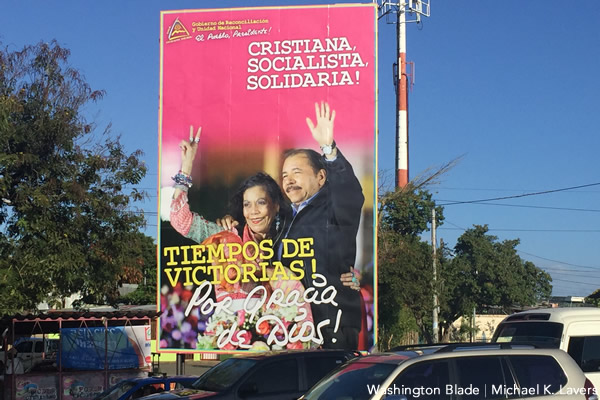
Un cartel en Managua, Nicaragua, el 27 de febrero de 2018, promueve el presidente nicaragüense Daniel Ortega y su esposa, la vicepresidenta Rosario Murillo. Protestas contra el gobierno del país centroamericano han dejado cientos de muertos. (Foto del Washington Blade por Michael K. Lavers)
Los EEUU en Julio sancionó al comisionado de la Policía Nacional Francisco Javier Díaz Madriz y dos otros altos funcionarios del gobierno bajo una ley que congela los activos de ciudadanos extranjeros que cometen abusos contra los derechos humanos y les prohíbe ingresar a los EEUU. Los activistas dijeron al Blade que apoyan más sanciones en contra el gobierno de Ortega Murillo, y no una posible intervención militar de los EEUU y/o otros países para expulsarlo del poder.
“Lo que no estamos de acuerdo desde mi punto de vista es una intervención militar,” dijo el activista gay de Chinandega.
La activista que salió de Managua y volvió a Chinandega después del comienzo de las protestas estaba en acuerdo con sus compañeros que dijeron Ortega y Murillo tienen que renunciar. La activista dijo que los partidarios del gobierno con posiciones en las instituciones del Estado nicaragüense también deben salir.
“Hay impunidad,” la activista dijo al Blade.
The White House
Hundreds protest ICE killing of Renee Nicole Good in D.C.
Married queer woman shot in Minneapolis on Wednesday

Hundreds of people took to the streets of D. C. on Thursday night to protest the killing of a U.S. citizen by a U.S. Immigration and Customs Enforcement agent.
Protests began at the busy — and increasingly queer — intersection of 14th and U Streets, N.W. There, hundreds of people held signs, shouted, and made their way to the White House to voice their dissent over the Trump-Vance administration’s choice to increase law enforcement presence across the country.
The protest, which also occurred simultaneously in cities large and small across the country, comes in the wake of the death of Minneapolis resident Renne Nicole Good at the hands of ICE Agent Jonathan Ross. Good left behind two children and a wife, Rebecca Good.
Records obtained by the Associated Press found that Ross was an Iraq War veteran and nearly two decades into his career with U.S. Border Patrol and ICE.
Good was gunned down just blocks away from where George Floyd was killed by police in 2020, sparking weeks of national protests. Minnesota officials say the FBI has blocked their access to an investigation into the fatal shooting, according to a BBC story published on Friday.
In the nation’s capital, protesters marched from the intersection of 14th and U Street to Lafayette Square, right outside the White House. Multiple D.C. organizations led the protest, most notably Free DC, a nonprofit that works to ensure the right of “self-determination” for District residents, as many local laws can be reviewed, modified, or overturned by Congress. Free DC had organized multiple protests since the Trump-Vance administration was elected.
The Washington Blade spoke to multiple protesters towards the tail end of the protest about why they came out.
Franco Molinari, from Woodbridge, Va., crossed the Potomac to partake in his first-ever protest.
“I don’t appreciate ICE and the use of federal agents being pretty much militarized against America,” Molinari said while holding a “Justice for Renee” sign. “The video of Renee being executed cartel style in her car was enough for me to want to come out, to at least do something.”
Molinari, like many others the Blade spoke with, found out about the protest on Instagram.
“It was my friend there, Sarah … had sent a link regarding the protest to a group chat. I saw it in the morning, and I thought, ‘You know what, after work, I’m head out.’”
He also shared why protesting at the White House was important.
“I already saw the response that the president gave towards the murder of Renee, and it was largely very antagonizing,” Molinari said.
President Donald Trump, along with federal leaders under him, claimed that Good “violently, willfully and viciously ran over the ICE officer.” The president’s claims have been widely discredited through multiple videos of the incident, which show Good was attempting to leave the scene rather than attacking the officer.
“I hope that anybody would be able to see that and see the response and see for themselves that it just is not correct,” Molinari said.
The Blade also spoke with leftist influencer Dave the Viking, who has more than 52,000 followers on TikTok, where he posts anti-fascist and anti-Trump videos.
“We’re out here to make sure that this regime can’t rewrite history in real time, because we all know what we saw … we’re not going to allow them to run with this narrative that they [ICE agents] were stuck in the snow and that that poor woman tried to weaponize her car, because we all saw video footage that proves otherwise,” he told the Blade. “We’re not going to let this regime, the media, or right-wing influencers try to rewrite history in real time and try to convince us we didn’t all see what we know we saw.”
Dave the Viking continued, saying he believes the perceived power of ICE and other law enforcement to act — oftentimes in deadly and unjustifiable ways — is a product of the Trump-Vance administration.
“There’s a line between fascism and anti-fascism. These motherfuckers have been pushing that envelope, trying to label an idea a terrorist organization, to the point of yesterday, crossing that line hardcore. You face the point of looking at history and saying there was this 1989, 2003 America, where we’re just going in, raiding resources. Where is this fucking 1930s Germany, where we’re going in and we’re about to just start clearing shit and pulling knots? Yeah, nope. We proved that shit yesterday.”
Two people were injured in another shooting involving federal agents, this time Border Patrol in Portland, Ore., on Thursday afternoon.
KC Lynch, who lives near American University, also spoke about her choice to protest with a group.
“I came out today because everything that ICE has done is absolutely unacceptable, not only killing this one woman, but also the fact that they’ve been imprisoning people in places that are literally, that have been literally on record by international organizations shown to be human rights violating. It’s unbelievably evil.”
Lynch also echoed Dave’s opinion about parallels between the Trump-Vance administration and the rise of Adolf Hitler in Nazi Germany.
“It’s literally what happened before the Holocaust. We should all be scared. We should all be angry. I’m so angry about it … even talking about it — I’m sorry,” she said before getting choked up.
Lynch emphasized that despite the circumstances in which people were protesting together, the sense of community was strong and powerful.
“I feel like it’s important for people to know that we’re angry, even if no policy changes come out of it, and it’s just nice to yell and be angry about it, because I feel like we’ve probably all been feeling this way, and it’s nice to be around people that are like minded and to like have a sense of community.”
Venezuela
AHF client in Venezuela welcomes Maduro’s ouster
‘This is truly something we’ve been waiting for’ for decades

An AIDS Healthcare Foundation client who lives in Venezuela told the Washington Blade he welcomes the ouster of his country’s former president.
The client, who asked the Blade to remain anonymous, on Thursday said he felt “joy” when he heard the news that American forces seized Nicolás Maduro and his wife, Cilia Flores, at their home in Caracas, the Venezuelan capital, during an overnight operation on Jan. 3.
“This is truly something we’ve been waiting for for 26 or 27 years,” the AHF client told the Blade.
Hugo Chávez became Venezuela’s president in 1999. Maduro succeeded him in 2013 after he died.
“I’ve always been in opposition,” said the AHF client, who stressed he was speaking to the Blade in his personal capacity and not as an AHF representative. “I’ve never agreed with the government. When I heard the news, well, you can imagine.”
He added he has “high hopes that this country will truly change, which is what it needed.”
“This means getting rid of this regime, so that American and foreign companies can invest here and Venezuela can become what it used to be, the Venezuela of the past,” he said.
The AHF client lives near the Colombia-Venezuela border. He is among the hundreds of Venezuelans who receive care at AHF’s clinic in Cúcuta, a Colombian city near the Táchira River that marks the border between the two countries.
The Simón Bolívar Bridge on the Colombia-Venezuela border on May 14, 2019. (Washington Blade video by Michael K. Lavers)
The AHF client praised U.S. President Donald Trump and reiterated his support for the Jan. 3 operation.
“It was the only way that they could go,” he said.
The Venezuelan National Assembly on Jan. 4 swore in Delcy Rodríguez, who was Maduro’s vice president, as the country’s acting president. The AHF client with whom the Blade spoke said he is “very optimistic” about Venezuela’s future, even though the regime remains in power.
“With Maduro leaving, the regime has a certain air about it,” he said. “I think this will be a huge improvement for everyone.”
“We’re watching,” he added. “The actions that the United States government is going to implement regarding Venezuela give us hope that things will change.”
Minnesota
Reports say woman killed by ICE was part of LGBTQ community
Renee Nicole Good shot in Minneapolis on Wednesday

A U.S. Immigration and Customs Enforcement agent shot and killed a woman in Minneapolis as she attempted to drive away from law enforcement during a protest on Wednesday.
The Star Tribune newspaper identified the victim as Renee Nicole Good, 37, a Minneapolis resident who lived blocks from where she was shot in the Central neighborhood, according to reports. Donna Ganger, Good’s mother, told the Star Tribune that her daughter lived in the Twin Cities with her wife.
Multiple videos of the shooting have gone viral on social media, showing various angles of the fatal incident — including footage that shows Good getting into her car and attempting to drive away from law enforcement officers, who had their weapons drawn.
In the videos, ICE agents can be heard telling Good to “get out of the fucking car” as they attempted to arrest her. Good, who press reports say was married to a woman, ended up crashing her car into an electric pole and other vehicles. She was later transported from the scene of the shooting and died at the hospital.
President Donald Trump defended the ICE agent on Truth Social, saying the officer was “viciously” run over — a claim that coincides with Homeland Security Secretary Kristi Noem’s assessment of the situation. Noem, a South Dakota Republican, insisted the officer “fired defensive shots” at Good after she attempted to run over law enforcement agents “in an attempt to kill them — an act of domestic terrorism.”
Multiple state and local officials disputed claims that the shooting was carried out in self-defense at the same time Noem was making those assertions.
An Instagram account that appears to belong to Good describes her as a “poet and writer and wife and mom and shitty guitar strummer from Colorado; experiencing Minneapolis, MN,” accompanied by a rainbow flag emoji.
A video posted to X after the shooting shows a woman, reportedly her wife, sitting on the ground, crying and saying, “They killed my wife. I don’t know what to do.”
“We’ve dreaded this moment since the early stages of this ICE presence in Minneapolis,” Mayor Jacob Frey said during a Wednesday press conference. “Having seen the video myself, I want to tell everybody directly that [the DHS’s claim of self-defense] is bullshit. This was an agent recklessly using power that resulted in somebody dying, getting killed.”
“I have a message for ICE. To ICE, get the fuck out of Minneapolis,” Frey continued. “We do not want you here. Your stated reason for being in this city is to create some kind of safety, and you are doing exactly the opposite. People are being hurt. Families are being ripped apart. Long-term Minneapolis residents that have contributed so greatly to our city, to our culture, to our economy are being terrorized, and now somebody is dead. That’s on you, and it’s also on you to leave.”
Across the Capitol, members of the House and the Senate condemned the actions of the officer.
“There’s no indication she’s a protester, there’s nothing that at least you can see on the video, and therefore nothing that the officers on the ground could see that identify her as someone who’s set out to try to do harm to an ICE officer,” U.S. Sen. Elizabeth Warren (D-Mass.) said Wednesday night on MS NOW’s “The Weeknight.”
“There is no evidence that has been presented to justify this killing,” House Minority Leader Hakeem Jeffries (D-N.Y.) said in a statement on his website. “The masked ICE agent who pulled the trigger should be criminally investigated to the full extent of the law for acting with depraved indifference to human life.”
“ICE just killed someone in Minneapolis,” U.S. Rep. Robert Garcia (D-Calif.) the highest-ranking Democrat on the House Oversight Committee, posted on X. “This administration’s violence against communities across our country is horrific and dangerous. Oversight Democrats are demanding answers on what happened today. We need an investigation immediately.”
In a statement to the Advocate, Human Rights Campaign President Kelley Robinson wrote, “Today, a woman was senselessly killed in Minneapolis during an ICE action — a brutal reminder that this agency and the Trump regime put every community at risk, spreading fear instead of safety. Reports that she may have been part of the LGBTQ+ community underscore how often the most vulnerable pay the highest price.”
National LGBTQ Task Force President Kierra Johnson also responded to Good’s death.
“We recognize and mourn the loss of Renee Nicole Good and extend our condolences to her family, loved ones, and community,” said Johnson in a statement. “This loss of life was preventable and reprehensible, particularly coming at the hands of federal agents.”
-

 National3 days ago
National3 days agoWhat to watch for in 2026: midterms, Supreme Court, and more
-

 District of Columbia5 days ago
District of Columbia5 days agoTwo pioneering gay journalists to speak at Thursday event
-

 a&e features5 days ago
a&e features5 days agoQueer highlights of the 2026 Critics Choice Awards: Aunt Gladys, that ‘Heated Rivalry’ shoutout and more
-

 Colombia4 days ago
Colombia4 days agoBlade travels to Colombia after U.S. forces seize Maduro in Venezuela

